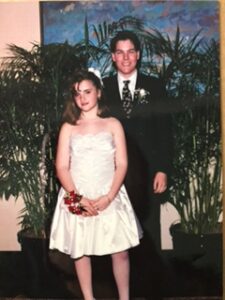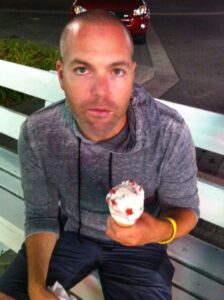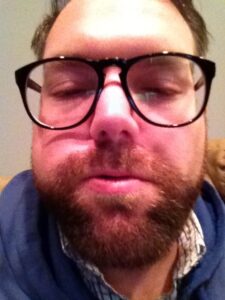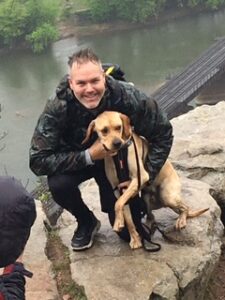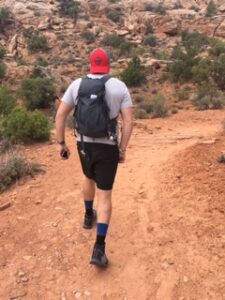There is an infinite bright light which shines in all of us. It’s a light which guides us and if we are so inclined will light the way for others. Sometimes we let darkness slip in, not on purpose, but simply because we are human. To be human means to be imperfect, and yet we are all created perfectly, so therein lies a great contradiction – knowing deep within our hearts we are amazing creations, but acting like anything less.
It is the challenge of this human adventure and this adventure becomes our story.
Everyone has a story.
I am Mark Brodinsky and this is The Sunday Series.
The Sunday Series (153): High on Life
For Noah Kodeck it was that first shot that numbed the pain, the shot that took it all away, the one that made him feel so good. But it was the search for that feeling which would control much of the rest of his life.
It wasn’t always this way.
“I had an idyllic childhood,” says Noah. “I grew up as the middle child of three boys. My dad is an attorney, my mom is a nurse and my parents loved me. They always protected me. I had an upper middle class upbringing: summers at the beach, sleep away camp, a six-week backpacking trip through Alaska when I was in high school. My parents were incredible people. We knew we were loved.”
But sometimes even love’s not enough.
Noah was a swimmer and a tennis player and while in high school he developed chronic shoulder pain in his right shoulder. First the doctors scoped the shoulder then they decided Noah would need a bicep tendon transplant. The open shoulder surgery left Noah in a tremendous amount of pain, that is until the nurse came in with some blessed relief. A blessing which would become Noah’s curse.
“I still vividly remember that first shot of demerol. I cannot explain it. It was like nothing I ever experienced before. I was in a lot of pain from the surgery, and the nurse came in and gave me the shot in my thigh and in one second everything seemed really manageable. It was an incredible feeling. I knew I liked the demerol a lot. My doctor gave me valium post-surgery and if it were up to me I would have laid in bed and just taken the valium. I remember my mother saying let’s stop the valium, let’s get up, go out and go for a walk and help you heal.”
For Noah, the drugs fit perfectly into what he describes as an “addictive personality.” “I kept a tight lid on myself,” says Noah. “I like to be in control of myself, but when I used something mood-altering, I tended to use it in excess. I knew I liked it, I also knew I shouldn’t do it. I went off to college and did my fair share of drinking and smoking and occasional pill popping, but I wouldn’t say anything crazy or out of the ordinary. But it was the mid 90’s and I was partaking of this stuff before opiates were what opiates are today. What we know now we didn’t know then.
Noah says his first year after college was his most sober year as he entered the workforce. But things started to unravel in the early 2000’s. Although he didn’t want to move back home from Colorado, where he had attended college, Noah’s father helped orchestrate a deal to find him employment in Maryland. Noah figured he would come back for a year, put his time in at work and then do whatever he wanted to do, maybe even a move back out west to California. But we all make plans and God laughs. For Noah, laughter was not part of his next few years.
“During my unraveling period my aunt was diagnosed with colon and liver cancer, my grandmother was dying of cancer, my brother got married, my golden retriever had to be put down, my parents sold the childhood home we grew up in, 9/11 happened while I was working in DC, then the anthrax scare, then the DC sniper and to cap it all off I was carjacked at gunpoint by two guys in the summer of 2003. So I got prescribed xanax and ambien and had minor surgery…and that meant some more pills. It started out I would just use them post-operative, but I also needed them to get on a plane. I had a really bad flight into Denver when I was in college and it turned me off to flying, so I would pop them anytime I needed to fly.”
“I started getting prescriptions for various reasons and that kept it going. As the years ticked by I would use the pills before a Thursday or Friday night out with friends. What seemed like controlled usage went from Thursday or Friday night to other nights. Still I figured I didn’t have a problem if I wasn’t using at work. But then popping a pill at 6pm, became 4pm, then 2pm, then you wake up knowing you need something to start your day or you can’t function. I held that pattern for a number of years, but then I had knee surgery. I called my doctor and said I need a refill for my pain pills, he said he’d give me one more refill then to switch to Tylenol or Advil. I called my primary care doctor and told him I have a chronic knee issue and my ortho doesn’t want to deal with my prescription anymore. From my ortho I was getting 30 pills at a time, my general practitioner wrote a script for 180 pills and three refills, I remember thinking I just hit the jackpot! This is the best thing that’s ever happened to me.”
The addiction picked up speed as Noah developed insomnia and needed Ambien and Xanax to sleep and for traveling and flying. He says his parents had surgeries, so there was always stuff in their medical cabinet as well. He would call friends who had doctor friends and tell them his doctor was out-of-town and he couldn’t get his prescriptions. When Noah’s insurance stopped paying he convinced his pharmacist to let him self pay. “It all seemed very normal to me and I didn’t believe I could have a problem because I didn’t grow up in a broken family. I grew up with everything I ever wanted and my parents provided us this amazing life. I didn’t think I looked like anyone who would have a problem would look like,” says Noah.
Noah says in 2007 and 2008 he kept a journal and wrote stuff down and the number one goal he had for the year was to “get off the dope.” But as with many addicts the desire to stop is secondary to the next hit, the next high. Noah says every time his bottle got low he would panic. He says his life chasing the medications and worrying about getting them became a full-time job. “I remember interviewing for a job in Philly and being terrified I would be away from my sources and what would I do?” says Noah. “Fortunately I didn’t get the job.”
In March of 2012, as he was running low on supply, Noah said the doctor started asking questions since he was running out too frequently. He called a friend and asked him to call his doctor, his friend, knowing something was wrong, told him no. Noah says after a heated argument, where he totally disrespected his mother and a lack of supply, the pain of his addiction became too much, he came clean to his mother, he reached out to the cousin of a long-time friend who was in long-term recovery and he called his doctor.
The doctor told him he would start him on Suboxone, a prescription medication used to treat adults who are addicted to opioids, and his buddy’s cousin came to Noah’s apartment to clean him out. He also started going to AA meetings which didn’t seem to work. Noah said he felt “disjointed, out-of-place, out of sorts.” Within a month of quitting Noah’s doctor convinced him to go to a long-term treatment program in Mississippi. “It was really hard and really amazing and insightful, but it wasn’t enough,” Noah says. “I came out of rehab and played sober for about ten weeks, I would relapse and then go on-and-off the Suboxone. I didn’t tell anyone.”
As with many addicts, when the prescriptions run out, they have no choice but to hit the streets to find supply. Noah started buying from friends and some “shady people” and then he met a guy whose son was fresh out of rehab. Noah said he would take the son to meetings and talk to him and help him, but it didn’t work. “The kid had a dealer,” says Noah. “He introduced me to his dealer and that was the beginning of the end of that. The dealer had pills and even heroine. The kid had the relationship, I had the car and the money.”
Through it all Noah stayed gainfully employed and even earned his masters through two years of additional schooling. It’s one of the reasons addicts can be so hard to judge, if they function in society, so many others are blind to the pain. Noah says he was under a ton of pressure to keep up the facade, so he isolated himself from many of his friends, telling them he just wanted to chill at home or didn’t feel well, instead of going out. Then disaster struck.
“I was using and hanging out with that kid”, says Noah. “He had been out-of-town so I picked him up when he came back and we made a run to the dealer. I went to the beach and tried to call the kid, but he didn’t answer. The kid’s dad text me to call him right away. It was then he told me he found his son dead in his bed from an overdose.”
“You would think that would be enough, but it wasn’t. When he died I found a way to get the dealer’s number and I started my own relationship with him. It went on for a few more months but then I had enough. I was spending a lot of money and it was becoming an issue. I knew if I didn’t do something it would take me down and take me down quickly. In May of 2014 my mom hurt her ankle and I flew back with her to their Colorado home. I went to the dispensary and asked for medical marijuana to help me sleep. I had a very very bad reaction to it and had to tell my mom. That May I decided I was done. This was not fun, it wasn’t enjoyable, I felt crappy, I couldn’t keep lying.”
Since that time Noah has been on Suboxone every day. “There is no urgency to get off it,” says Noah. “Some people say you are not sober until you are off of it, but opiates are really, really addictive. Every day of my life I think about drugs. It is always there. Taking Suboxone negates the craving or desire. I know I can’t get high because I’m on a block and know it can’t happen. I’ve gotten back to the gym with two different trainers and I take a spin class once a week. I keep myself very active and very busy.”
Noah says he is sharing his painful story because he wants to help. “This is impacting a lot of people, who just like me, couldn’t reconcile the fact I was an addict with the great life I had. It’s not like the old days of what you thought addiction was. It does not discriminate – black, white, rich, poor, jewish, catholic and it didn’t happen overnight, it was a progression. I didn’t screw up at school, I graduated on time, I maintained good grades I got a masters, I kept a really good job. But the addiction to the opiates becomes in essence its own full-time job. Somehow, at some point, I gained the courage to recognize I need help. That one sentence alone saved me.”
Noah says his advice to others trying to stay clean and sober is, “don’t quit before the miracle. I tell other people it’s one minute at a time, then it’s one hour, then it’s one day. Just hang in there.”
Noah says he is happy today: “I get to wake up every day and do things I enjoy and to travel. I got a dog in February and he is a cornerstone of my recovery. I never saw myself as a victim. I wasn’t in control, it just happened to me. I have an ego and I see myself as invincible, like this kind of thing can’t happen to me. It could and it did. The biggest thing for me was finding humility in this…once I found that, I started healing.”
The ultimate freedom – to simply be high on life.
Until next time, thanks for taking the time
Mark Brodinsky
Author: The Sunday Series with Mark Brodinsky: Real Stories of Courage, Hope & Inspiration, Vol I: (http://amzn.to/2tmmdPo)
Author: The #1 Amazon Best Seller, It Takes 2. Surviving Breast Cancer: A Spouse’s Story: (http://amzn.to/2tn7jbI)
Huffington Post: (http://www.huffingtonpost.com/mark-brodinsky/)
The Profile: (http://www.talkinggood.com/profiles/MarkBrodinsky)
Inspiring Company Stories: (http://www.ushacareers.com/category/inspirational-stories/)

